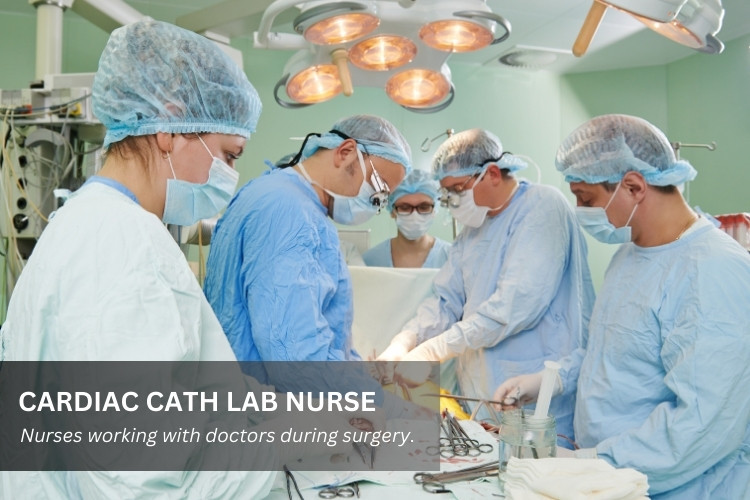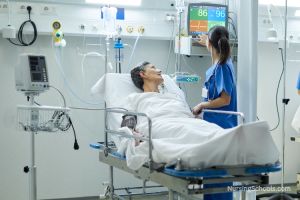Cardiac Catheter Lab Nurse Career Guide

Overview
What Is a Cardiac Catheter Lab Nurse?
A Cardiac Catheter Lab Nurse is a Registered Nurse (RN) who specializes in assisting cardiologists and other healthcare professionals in performing diagnostic and therapeutic procedures in the cardiac catheterization lab. These nurses work with patients undergoing procedures such as angiograms, angioplasty, stent placements, and catheter-based interventions to treat coronary artery disease and other heart conditions.
Cardiac Catheter Lab Nurses are highly skilled in monitoring patients during procedures, ensuring patient safety, and providing care before, during, and after the procedure. They play an essential role in preparing patients for procedures, explaining the process, and assisting the medical team during catheterization procedures.
This role requires expertise in cardiovascular diseases, invasive diagnostic procedures, and the ability to react swiftly to complications during high-pressure situations in a fast-paced environment.
Education
How To Become a Cardiac Catheter Lab Nurse
Becoming a Cardiac Catheter Lab Nurse requires a combination of traditional nursing education, clinical experience, certification, and specialized training in cardiac care and catheterization procedures. Follow these steps to enter this challenging and rewarding healthcare career:
- Earn a Nursing Degree. Complete an Associate Degree in Nursing (ADN) or a Bachelor of Science in Nursing (BSN). A BSN is typically preferred for specialized roles like cardiac catheter lab nursing, particularly in larger hospitals or healthcare facilities.
- Pass the NCLEX-RN. Obtain your nursing license by passing the National Council Licensure Examination for Registered Nurses (NCLEX-RN).
- Gain Clinical Experience. Work as a Registered Nurse (RN) in a hospital's cardiology department or intensive care unit (ICU) to develop experience in cardiovascular care.
- Obtain Specialized Training. Take continuing education courses or attend workshops in catheterization procedures, cardiac diagnostic techniques, and invasive cardiology procedures.
- Optional Certification. Consider becoming certified as a Cardiac Vascular Nurse (CVN) or obtaining certification in electrophysiology or invasive cardiac care through the American Nurses Credentialing Center (ANCC) to enhance your expertise and career prospects.
How long does it take to become a Cardiac Catheter Lab Nurse? It typically takes 4-6 years to become a Cardiac Catheter Lab Nurse, including nursing education, licensure, and clinical experience. Additional certification and training in invasive cardiology procedures can enhance career opportunities and knowledge in the field.
Average Salary
How Much Does a Cardiac Catheter Lab Nurse Make?
Salaries for Cardiac Catheter Lab Nurses can vary depending on experience, location, and the healthcare facility. On average, a Cardiac Catheter Lab Nurse can expect to earn between $80,000 and $110,000 annually.
Average annual salary for a Cardiac Catheter Lab Nurse:
- Entry-level: $80,000 - $90,000 per year.
- Mid-career: $90,000 - $100,000 per year.
- Experienced: $100,000 - $110,000+ per year.
The U.S. Department of Labor reports that Registered Nurses earn an average of $42.00 per hour, which translates to approximately $87,360 annually. Cardiac Catheter Lab Nurses, working in specialized cardiology settings, may earn higher wages depending on their expertise in invasive procedures and the complexity of the care provided.
Job Duties
What Does a Cardiac Catheter Lab Nurse Do?
Cardiac Catheter Lab Nurses are responsible for assisting in the preparation and execution of cardiac catheterization procedures. They monitor patients throughout the procedures, ensure patient safety, and provide post-procedure care to ensure optimal recovery and outcomes. The most common job duties of a Cardiac Catheter Lab Nurse include:
- Preparing Patients. Ensure patients are properly prepared for the procedure, including conducting assessments, explaining the procedure, and setting up monitoring equipment.
- Assisting in Procedures. Assist the cardiologist and surgical team during the catheterization process, ensuring proper positioning and readiness of instruments.
- Monitoring Patient Vital Signs. Continuously monitor vital signs, including heart rate, blood pressure, oxygen levels, and EKG readings during procedures.
- Managing Sedation and Pain. Administer sedation and local anesthesia as prescribed and ensure that the patient remains comfortable throughout the procedure.
- Preventing Complications. Monitor for signs of complications such as arrhythmias, bleeding, or allergic reactions, and respond promptly to address issues.
- Post-procedure Care. Provide immediate post-procedure care, including wound care, monitoring for bleeding, and ensuring that the patient recovers safely from sedation.
- Patient Education. Educate patients on recovery, activity restrictions, and follow-up care after the procedure to ensure optimal outcomes.
- Advanced Duties. Experienced nurses may take on leadership roles, such as mentoring new staff, assisting with quality improvement initiatives, or leading educational programs for patients.
Cardiac Catheter Lab Nurses play a vital role in ensuring the success of catheterization procedures by providing expert care, managing patient comfort, and ensuring that any complications are handled quickly and efficiently.
Essential Skills
What Skills Does a Cardiac Catheter Lab Nurse Need?
Cardiac Catheter Lab Nurses must have specialized knowledge in cardiology and invasive procedures, as well as strong critical thinking skills. They must be able to work under pressure, as catheterization procedures can be high-stress environments that require quick decision-making. Here are some of the skills a Cardiac Catheter Lab Nurse needs to succeed:
- Cardiology Knowledge. Strong understanding of cardiovascular diseases, diagnostic procedures, and treatments like angioplasty and stenting.
- Clinical Monitoring Skills. Ability to monitor vital signs, EKGs, and other indicators of cardiovascular function during invasive procedures.
- Pain Management. Administer sedation and manage patient pain during catheterization procedures.
- Attention to Detail. Ensure that all steps are taken in preparation for the procedure, monitor for any issues during the procedure, and accurately document patient information.
- Emergency Response. Be prepared to respond to any complications or emergencies that arise during the procedure, such as arrhythmias or bleeding.
- Patient Education. Educate patients on the risks, benefits, and recovery process following a cardiac catheterization procedure.
- Teamwork. Work collaboratively with cardiologists, surgeons, and other healthcare professionals to provide the best care for patients.
- Stress Management. Stay calm and composed in high-pressure situations, especially when assisting during complex or emergency procedures.
One of the biggest challenges of being a Cardiac Catheter Lab Nurse is handling the high-stakes nature of the work. However, the role is deeply rewarding, as you play an integral part in diagnosing and treating heart disease and helping patients live longer and healthier lives.
Work Environment
Where Does a Cardiac Catheter Lab Nurse Work?
A Cardiac Catheter Lab Nurse typically works in specialized departments within hospitals known as cardiac catheterization labs, where diagnostic and therapeutic cardiovascular procedures are performed. These settings require a sterile, controlled environment for the high-precision work involved. The most common workplaces for a Cath Lab Nurse include:
- Cardiac catheterization labs in hospitals
- Emergency rooms for rapid response to cardiac emergencies
- Intensive care units assisting with cardiac patients
- Outpatient cardiac care centers
Additionally, the Cath Lab Nurse may find opportunities in outpatient cardiac care centers where similar procedures are conducted, but patients are not required to stay overnight. Their role is critical in both emergency and scheduled interventions, making their presence vital not only in cath labs but also in areas of the hospital where acute cardiac care is provided, such as emergency rooms and intensive care units, to assist with rapid response teams for cardiac emergencies.
Last updated: July 22, 2025
References:
- Associate of the American College of Cardiology. American College of Cardiology Foundation, Become an ACC Member. Retrieved July 22, 2025.
- Cardiac Vascular Nursing Certification. American Nurses Association, American Nurses Credentialing Center. Retrieved July 22, 2025.
- CHFN for the Clinical RN or Non-Clinical RN. American Association of Heart Failure Nurses, Certification. Retrieved July 22, 2025.
- Registered Nurses. Bureau of Labor Statistics, U.S. Department of Labor. Occupational Outlook Handbook. Retrieved July 22, 2025.
- What Is a Cardiac Catheter Lab Nurse. Indeed, Career Guide. Retrieved July 22, 2025.
- Cardiac Catheter Lab Nurse. Johnson & Johnson, Nursing Careers. Retrieved July 22, 2025.
- Cardiac Catheterization Laboratory Registered Nurse. PayScale, Browse Jobs by Industry. Retrieved July 22, 2025.


